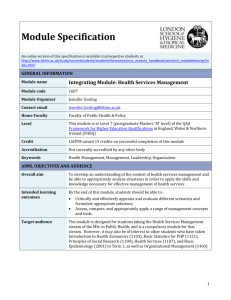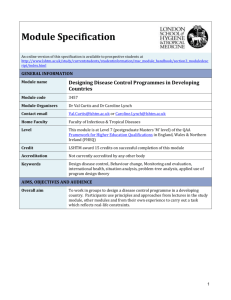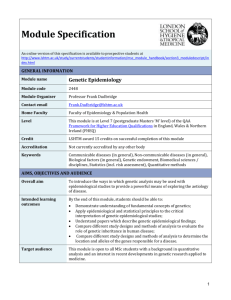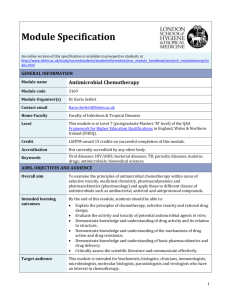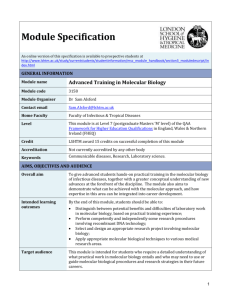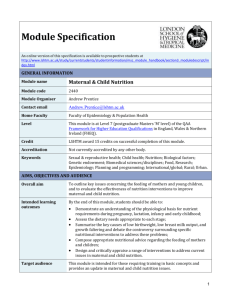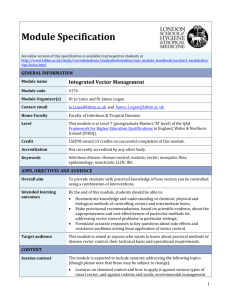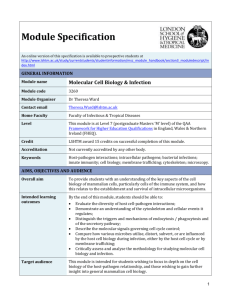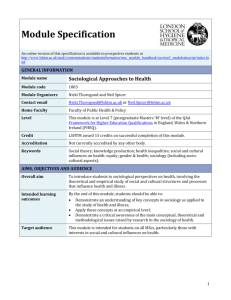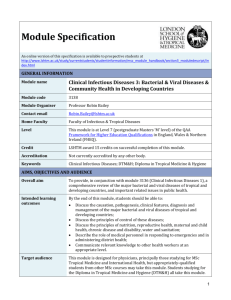1806 Integrating Module - Health Promotion Module Specification
advertisement
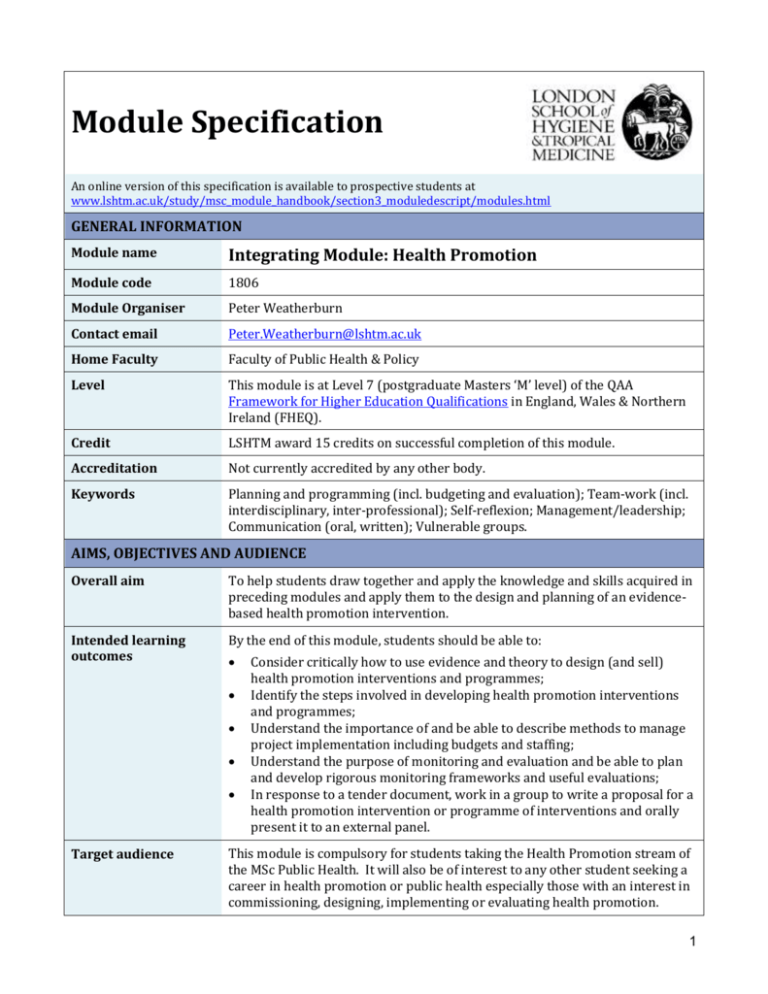
Module Specification An online version of this specification is available to prospective students at www.lshtm.ac.uk/study/msc_module_handbook/section3_moduledescript/modules.html GENERAL INFORMATION Module name Integrating Module: Health Promotion Module code 1806 Module Organiser Peter Weatherburn Contact email Peter.Weatherburn@lshtm.ac.uk Home Faculty Faculty of Public Health & Policy Level This module is at Level 7 (postgraduate Masters ‘M’ level) of the QAA Framework for Higher Education Qualifications in England, Wales & Northern Ireland (FHEQ). Credit LSHTM award 15 credits on successful completion of this module. Accreditation Not currently accredited by any other body. Keywords Planning and programming (incl. budgeting and evaluation); Team-work (incl. interdisciplinary, inter-professional); Self-reflexion; Management/leadership; Communication (oral, written); Vulnerable groups. AIMS, OBJECTIVES AND AUDIENCE Overall aim To help students draw together and apply the knowledge and skills acquired in preceding modules and apply them to the design and planning of an evidencebased health promotion intervention. Intended learning outcomes By the end of this module, students should be able to: Target audience Consider critically how to use evidence and theory to design (and sell) health promotion interventions and programmes; Identify the steps involved in developing health promotion interventions and programmes; Understand the importance of and be able to describe methods to manage project implementation including budgets and staffing; Understand the purpose of monitoring and evaluation and be able to plan and develop rigorous monitoring frameworks and useful evaluations; In response to a tender document, work in a group to write a proposal for a health promotion intervention or programme of interventions and orally present it to an external panel. This module is compulsory for students taking the Health Promotion stream of the MSc Public Health. It will also be of interest to any other student seeking a career in health promotion or public health especially those with an interest in commissioning, designing, implementing or evaluating health promotion. 1 CONTENT Session content The module will include 8 lectures and associated group-work sessions addressing the following topics (though these may be subject to change): Describing health promotion interventions and programmes. Stages of intervention design, including tendering, needs assessment, evidence review, programme and intervention planning, and capacity building budgeting. Using evidence alongside theory to develop health promotion interventions and prepare written tenders. Employing project management and budgeting skills to facilitate realistic implementation plans, including intervention transfer and scale-up. Developing rigorous and useful monitoring frameworks and potential evaluations. TEACHING, LEARNING AND ASSESSMENT Study resources provided or required A substantial reader is provided for students, including an overview of the module, the 8 lectures and a selection of associated recommended readings. Teaching and learning methods The module involves a combination of lectures and small group work. Lectures include consideration of case studies from high and low-income settings. Lecturers include LSHTM staff as well as external speakers with experience from government, academic and voluntary sectors. Students work together in small groups (3-5 people) to prepare and present a proposal for a health promotion intervention or programme. Assessment details Working in small groups of 3-5, students must prepare and present a 3,500 word funding proposal for a health promotion programme. The proposal will be presented to an invited panel during a mock tender interview. The group will submit the written tender revised in the light of the panel's comments and feedback, together with an individually prepared 700-1000 word assessment of the strengths and weakness of the groups proposed intervention (a Critical Limitations Analysis). Each group of students shares a mark (0-5) for their final written group tender. The individual Critical Limitations Analysis will receive an additional gradepoint (0-5) based on comprehensiveness in identifying the most important limitations of the intervention designed and presented in their own group exercise. The Group Tender contributes 65%, and the individual Critical Limitations Analysis contributes 35% of the final GPA for the module. For students who are required to re-sit, or granted a deferral or new attempt, the task will be to submit an individual written 2,000-word assignment relating to the original task. Assessment dates The draft written Group Tender (3,500 words) will be due on Friday 13 May at 17:00 hours. Group interviews for the mock tender exercise will occur on Wednesday 18 May . The final written assessments (revised Group Tender and Individual Limitations Analysis) will be due on Friday 20 May at 14:00 hours. For students who are required to re-sit, or granted a deferral or new attempt, the assessment deadline will be the standard School-recommended date in mid/late September. The essay title will be released for coursework-type resits 3 weeks prior to the deadline for submission 2 Language of study and assessment English (please see ‘English language requirements’ below regarding the standard required for entry). TIMING AND MODE OF STUDY Duration The module runs for 5 weeks at 2.5 days per week. Each week it runs between Wednesday afternoon (2.00 p.m.) and Friday afternoon (5.00 p.m.). Dates For 2014-15, the module will start on Wednesday 22 April and finish on Friday 22 May 2015. Timetable slot The module runs in LSHTM timetable slot E. Mode of Study The module is taught face-to-face in London. Both full-time and part-time students follow the same schedule. Learning time The notional learning time for the module totals 150 hours, consisting of: Contact time ≈ 48 hours Directed self-study ≈ 26 hours Self-directed learning ≈ 26 hours Assessment, review and revision ≈ 50 hours APPLICATION, ADMISSION AND FEES Pre-requisites The module builds on material taught in other modules, including Health Promotion Theory (1109), Basic Epidemiology (2001), Health Policy, Process & Power (1117), Principles of Social Research (1104), Health Care Evaluation (1400), and Health Promotion Approaches and Methods (1807). Only in exceptional circumstances will students who have not undertaken the Health Promotion Theory and Health Promotion Approaches and Methods modules be allowed to take this module. Such cases should be discussed with the Module Organiser. English language requirements A strong command of the English language is necessary to benefit from studying the module. Applicants whose first language is not English or whose prior university studies have not been conducted wholly in English must fulfil LSHTM’s English language requirements, with an acceptable score in an approved test taken in the two years prior to entry. Applicants may be asked to take a test even if the standard conditions have been met. Student numbers Student numbers are typically 15-18 per year; numbers may be capped due to limitations in facilities or staffing. Student selection Preference will be given to LSHTM MSc students [particularly those following the Health Promotion stream of the MSc Public Health] and LSHTM research degree students. Other applicants meeting the entry criteria will usually be offered a place in the order applications are received, until any cap on numbers is reached. Applicants may be placed on a waiting list and given priority the next time the module is run. Full Registration (full participation) by LSHTM research degree students is required for this module. LSHTM research degree students must have also taken Health Promotion Theory (1109) and Health Promotion Approaches and Methods (1807) prior to undertaking for this module. 3 Fees For registered LSHTM MSc students, fees for the module are included within MSc fees (given on individual course prospectus pages). If registering specifically for this module, as a stand-alone short course, individual module fees will apply. Tuition fees must be paid in full before commencing the module, or by any fee deadline set by the Registry. Scholarships Scholarships are not available for individual modules. Some potential sources of funding are detailed on the LSHTM website. Admission deadlines For 2014-15: For registered LSHTM MSc students, the module choice deadline (for Term 2 and 3 modules) is Friday 21 November 2014. If registering specifically for this module, applications may be made at any time. All applications should be submitted by at latest 8 weeks prior to the start of the module. Formal registration will take place on the morning of the first day of the module. ABOUT THIS DOCUMENT This module specification applies for the academic year 2014-15 Last revised 11 March 2014 by Peter Weatherburn; 20 August 2014 minor updates by Ruth Ellis London School of Hygiene & Tropical Medicine, Keppel St., London WC1E 7HT. www.lshtm.ac.uk 4
